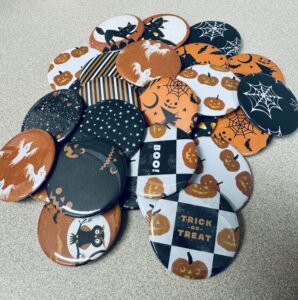 Last year Ian Dykstra introduced a new genre – horror fiction – to Books We Read fans in his post Halloween Horror, posing the question: “there’s enough horror in the real world, so why would you choose to experience more?” For a conversation starter, here is his explanation.
Last year Ian Dykstra introduced a new genre – horror fiction – to Books We Read fans in his post Halloween Horror, posing the question: “there’s enough horror in the real world, so why would you choose to experience more?” For a conversation starter, here is his explanation.
This is the objection that actually gives me pause, and has at times made me question my love for horror. But I’ve realized that fiction (and art as a whole) gives us powerful means to process events and greater opportunity for discourse about important issues. Unlike other genres, horror often turns what might have been subtext into text, and boils down our fears into tangible forms. I think that in this way, there is also an honesty in horror that’s unique.
His post starts with some classics, such as Mary Shelley’s Frankenstein, Robert Louis Stevenson’s The Strange Case of Dr. Jekyll and Mr. Hyde and Bram Stoker’s Dracula, all of them proven to provide more food for thought than one would expect. Explore more titles in his post, which recommends some movie adaptations, also popular this time of the year. They seem to have a tendency to produce a different experience, a strong point for his explanation.
As someone keen on bibliotherapy, reading for recovery, and adding bibliotherapy-centered programs to libraries, I would probably argue with one of the academic approaches claiming that horror fiction provides catharsis by “vicariously experience thrilling emotions from a point of relative safety,” as Ian writes. A group of readers might benefit from discussing these books, but as for me, I’d probably stick with safer reading choices for an ad-hoc book club or one-shot sessions instead.
But then there’s the post by Becky Diamond entitled Spook: Scare Yourself Silly this Halloween, a perfectly timed teaser of the “ghoulishly entertaining” book, Spook. After all, Books We Read was born in Chang Science Library, so we’d definitely promote famed science writer Mary Roach with her fresh approach investigating the afterlife and consider discussing it as a special topic.
If you are a fan of shorter texts to read for fun or pick for a group discussion, Becky also wrote about Stephen King’s Scary Short Stories recommending a plethora of titles, older and more recent, in anthologies such as The Bachman Books, Skeleton Crew and Different Seasons. Stephen King is definitely the author who offers something for everyone to read any time. In her post, Kate Greenberg also shares her experience with Stephen King, Eventually, calling attention also to the work of his son, author Joe Hill, such as his short story collection, Full Throttle.
Not surprising that many of King’s (scary) short stories also ended up as movie classics of all times, such as the The Shawshank Redemption and one of my all-time favorite movies, Stand By Me, based on his short story “The Body. Circling back to the conversation starter at the beginning of this post, these stories and adaptations demonstrate that in fiction labelled as horror fiction, horror might be only the pretext indeed. Actually, we are dealing with something else here: Friendship, coming of age, life-changing experiences, and more. As such, these stories, just like anything else we read during difficult times to escape the world around us, can provide the opportunity to think and talk about important current issues. Facing them and talking might just be the first steps toward healing.
Closing with a quote from his novel Duma Key:
“A hurt body and mind aren’t just like a dictatorship; they are a dictatorship. There is no tyrant as merciless as pain, no despot so cruel as confusion.”
Image credits: Halloween buttons designed by Roselyn R. in Chang Library